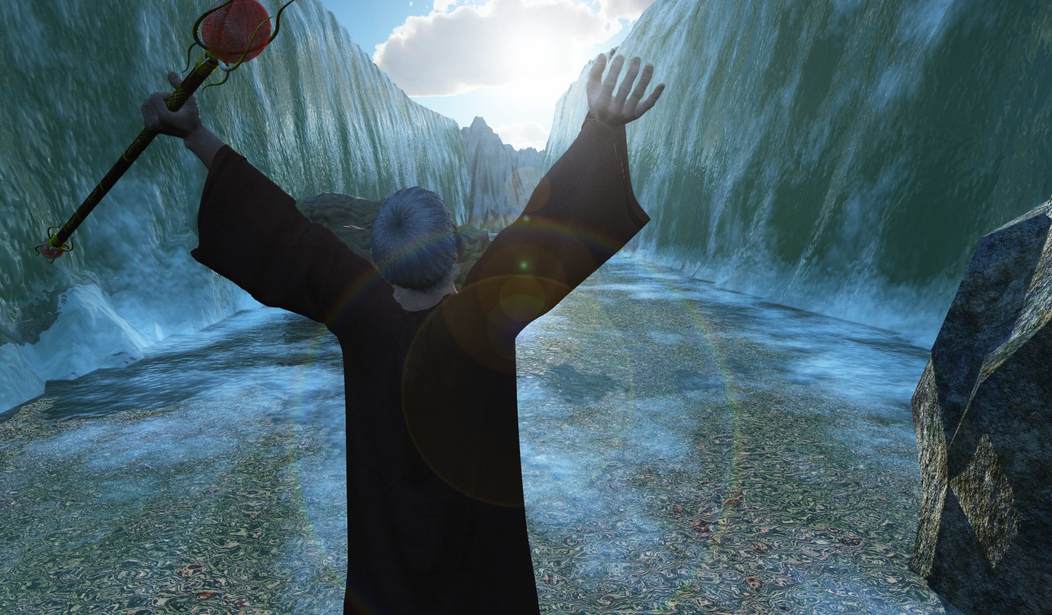Something about the mood of the moment brings to mind the story of Moses. The tone and tenor of presidential politics, the degeneration of racial discourse, economic and the political uncertainty — it all adds to a sense of unease and helplessness, like being at sea on the edge of a gathering storm. In times when it all seems like too much to bear, I think of Moses.
It’s not the man but his circumstances which interest me. When we think of Moses, our minds turn to the dramatic: a basket placed in a river, a bush burning on a mountainside, waters turning to blood, hail raining from the sky, a sea splitting in two. But what I find most relevant to our current moment are the mundane intermissions in Moses’ life. Did you know that Moses was 80 years old when God spoke to him from the burning bush? Eighty. Before that, aside from the invisible orchestrations of providence, it seems there was nothing particularly amazing about Moses’ life. At least nothing compared to what came next. He had to wait the span of a modern lifetime before gaining the first clue as to what God had in store for him. In the meantime, he labored under the knowledge that his people remained oppressed in slavery. Eighty years of uncertainty. Eighty years of waiting for something to change.
It wasn’t the first time God had worked that way. He made Abraham wait too. God let Abraham and his wife Sarah grow old without children, aging well past the point where they could reasonably expect a pregnancy. It was only then that God promised Abraham that he would become patriarch to a nation. The proclamation prompted Sarah to laugh. But it eventually came true. Abraham was 100 years old when he became father to Isaac.
These waits—Abraham’s wait for a son, Moses’ wait for a purpose, Israel’s wait for deliverance—seem as noteworthy as any miracle or wonder recorded in scripture. We’re not told much about the day-to-day routine of people waiting on God. But we can imagine that it wasn’t much different from our own, at least in the broad sense of dealing with the mundane business of living. It’s safe to say that men have spent far more time waiting on God then watching Him work miraculous wonders.
There’s a lesson in that, and it’s safe to say that it’s a lesson for today. God has chosen a moment to move in our lives, to move in our nation, to move in this world. He has chosen a moment to make himself known, to deliver his people, to change the established order. We don’t know when that moment is. It could be 80 years from now. It could be today. It might have started already, and we just don’t know it. Regardless, in moments of uncertainty when we look at the condition of our world and become tempted to worry, we should remember to wait.
There’s another side to that coin though. When God finally made his dramatic entrance into Moses’ life, the long-awaited deliverance came in unexpected form. It wasn’t instant. It wasn’t easy. And from a human perspective, it didn’t make much sense. God dispatched Moses to waltz into the court of the most powerful man in the world, backed by no army and carrying nothing but a walking stick, and told him to start making demands. Oh, and He assured Moses that Pharaoh was going to scoff and say no. Think about that. I want you to walk up to the most powerful man on the planet and tell him what to do, and he’s going to react pretty much exactly as you’d rationally expect. Would you be eager to do that? Would you wonder why you had to? Moses had his doubts, as you surely would have. But he proved faithful and obedient, which paid off in good time.
Surely, we can apply that lesson to our time. Are we not delivering a message from God to a power that rejects both us and Him? Whether the fight in question is cultural or political, in the context of a religion, a classroom, or around our kitchen table, we are each at times called upon to preach to hard and unreceptive hearts. Are we willing to do it anyway? Are we willing to enter the arena when we know, for the moment, that we will lose? Are we willing to actively wait? These are questions for our time.









Join the conversation as a VIP Member